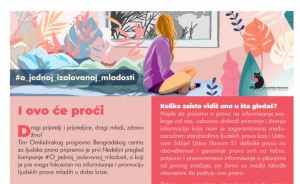 The Youth Program of Belgrade Centre for Human Rights has has launched a new campaign targeting young people in Serbia in the light of COVID-19 pandemic.
The Youth Program of Belgrade Centre for Human Rights has has launched a new campaign targeting young people in Serbia in the light of COVID-19 pandemic.
Dear friends!
This world has changed so much in the past few weeks.
We’re all witnessing major changes dictating joint efforts, new circumstances, new learning, new ways of doing things and opening new questions.
Our isolation in our safe (or unfortunately, not so safe) spaces brings up associations of deserted islands, islands of hope for some of us and islands of loneliness for others.
How do we feel on our deserted islands? And what will happen to us when we leave them? How different will we be?
Some of the values every crisis reminds us of will always be there. Solidarity. Equality. The need to do big things and help those in need. The need to see others and embrace fear and sorrow. The need to hope.
We will often reach out to you through social networks and share with you accurate and clear information about the coronavirus, the emergency and its social aspects. We will try to keep in close touch and communicate with you much as possible in the circumstances.
We will contemplate together the global changes affecting our lives. We will be asking: What is happening to the world? What are the key challenges we young people face in the 21 st century? Where are we, what will our priorities be from now on? What with human rights in times of crisis? Which values and principles do we hold dear now?
Let’s all think together about what we can do and how we can behave to turn this crisis into our contribution to our joint transformation into a more responsible, aware and empathetic world.
What can you do now for yourself and the world around you? Apparently, the time has come when we can all save the world together.
We hope you can spare several minutes to fill this questionnaire and tell us how well informed you are about the pandemic, how you feel, whether you have a skill or interest you would like to share with other young people.
Stay well, stay safe and write to us from your islands of hope!
You can always contact us by e-mail [email protected]. Or, if you prefer Instagram, follow us on @mladibgcentar and message us directly.
We hereby thank the UN Human Rights Team for supporting our initiative.
Your BCHR Youth Programme
 The Belgrade Centre for Human Rights (BCHR) has the pleasure to present its first Youth Programme Newsletter on Isolated Youth. The first issue focuses above all on information about and promotion of the human rights of young people in this time of crisis.
The Belgrade Centre for Human Rights (BCHR) has the pleasure to present its first Youth Programme Newsletter on Isolated Youth. The first issue focuses above all on information about and promotion of the human rights of young people in this time of crisis.











